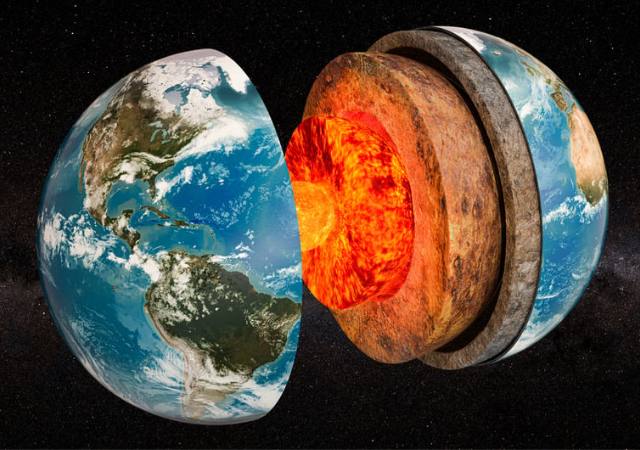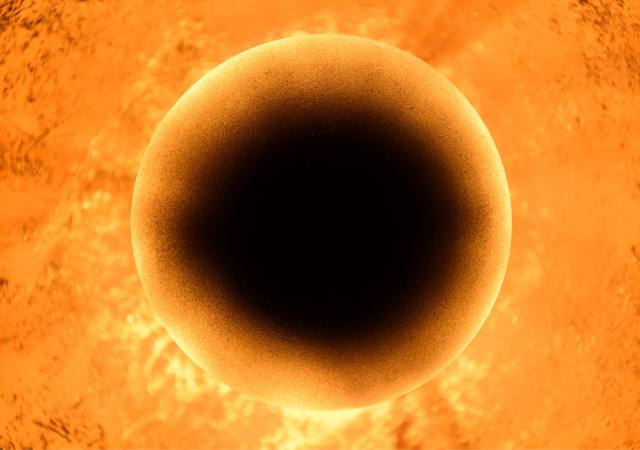*This post may contain affiliate links. This means we may make a commission if you purchase an item using one of our links*
It is a widely accepted fact that all the planets in our solar system have cores made up of iron, nickel, and other metallic elements. These cores are essential in keeping the planets in their orbits and providing them with gravity.
Continue reading to discover why planets have cores, whether or not they all contain metallic elements, and what would happen if one of these cores were to explode.
Why Do All Planets Have Cores?
Table of Contents

The formation of planets is a fascinating process that scientists have studied for centuries.
This process begins when dust and gas particles in space collide and start forming clumps. Gravity pulls these clumps together until they become large enough to create a planet.
As the planet continues to grow, it can pull in more material from its surroundings, giving it an even bigger mass. Eventually, the planet will reach its full size and shape and be ready to orbit around its host star.
During these initial stages, each planet exists in a molten state. Here, the heavy, metallic elements (such as iron and nickel) sink toward the planet’s center, while the lighter elements (like silicon) rise to the planet’s surface to form a crust.
As more material accumulates, the core becomes increasingly dense and creates a strong gravitational pull that helps to keep the planet together.
Every known planet likely formed via the same process; therefore, any solar system with metallic elements present in the space debris will create planets with metallic cores.
Can A Planet Not Have A Core?
A coreless planet is a hypothetical model where no metallic materials exist at the core. This type of planet could form in a water-rich environment, where the separation of layers would prevent the material from solidifying.
Two theories that dominate the idea of a coreless planet are the following:
A planet accretes matter from oxidized water-rich material where any metallic iron is contained within silicate mineral crystals, thus preventing it from sinking to create a metallic core.
A planet forms from water-rich and iron-rich materials where the metal reacts with water to form iron oxide. In this scenario, the iron oxide molecules could remain suspended in the mantle and never make their way to the core.
Still, if these coreless planets exist somewhere in the Universe, they will be unsuitable for life as we know it. Why? Because without a metallic core, the planet will lack a magnetic field to shield its inhabitants from harmful cosmic rays (generated by its central star).
The idea of a coreless planet is intriguing, as it is not something that has been observed in our solar system. It also raises questions about how such a planet could form and what kind of environment it would need to sustain itself.
Are All Planet Core Metal Based?

Mercury, Venus, and Earth have cores that consist of an iron-nickel mixture, while Mars’s center contains iron sulfide liquid with nickel traces. Even the gas giants of the Milky Way, Jupiter, and Saturn, contain iron and nickel within their cores.
Some planets, such as Earth and Venus, possess what scientists call an inner core and an outer core. In these instances, the inner core is solid, while the outer core remains molten or liquid. This is because of the substantial weight pressing down onto the core and compacting the molecules of these metallic elements into solid objects.
In contrast, less dense planets, such as Saturn, may remain liquid at their center because their composition of lighter gases and elements weighs less heavily on the center of the planet.
Generally speaking, planets closer to their star will have higher amounts of metallic elements than planets further away. This is because the gravity of the star draws heavier elements inward. This is also why inner planets are rocky, while outer planets are gaseous.
Still, each solar system is unique, and scientists now believe that coreless planets could exist somewhere in our Universe. But we won’t be able to say for sure until we develop the technology to image these exoplanets and find out what really lies at their center.
What Would Happen If A Planet’s Core Was Destroyed?
If the core of a planet was destroyed or suddenly disappeared, it’s hard to imagine an outcome that wouldn’t involve the planet collapsing in on itself. Take Earth; everything we see is floating on a molten liquid, kept in place by a solid core. If you suddenly removed that solid base, everything would collapse inwards to fill the space.
Planets rely on the mass of their central core to create a balanced gravitational field. If the core were destroyed, it would play havoc with this field; loose objects might lose their gravitational grounding while all the attached material is sucked into the core and condensed into its most compact form.
Still, the loss of a planet’s core is an unlikely scenario as scientists are yet to discover any mechanism that could pull a planet apart or cause an internal explosion. Achieving this would require a substantial chemical or nuclear process at the planet’s core.
Take Earth; to detonate our planet, you would need a ball of uranium with a minimum diameter of three miles. Not only would creating this pure ball of uranium be almost impossible but trying to break down the Earth’s structure by fighting against its gravitational energy and then preventing the internal neutrons from stopping fission in its tracks would require much more than our greatest tools and technology.
Summary
Every known planet has a core, each of which comprises metallic elements. This is because planets form from space debris, which contains trace elements of metals. When this debris combines to create a planet, the generated heat causes everything to melt and the heaviest elements to sink inward.
Still, scientists are developing their theories of “coreless planets,” and maybe one day, we’ll better understand how (and if) these types of planets can occur within our Universe.
References
Do all planets have an iron core like Earth or are we unique in the Universe? – Quora
Can planets explode? | (spaceanswers.com)
What would happen if you destroyed a planet’s core? – Quora

